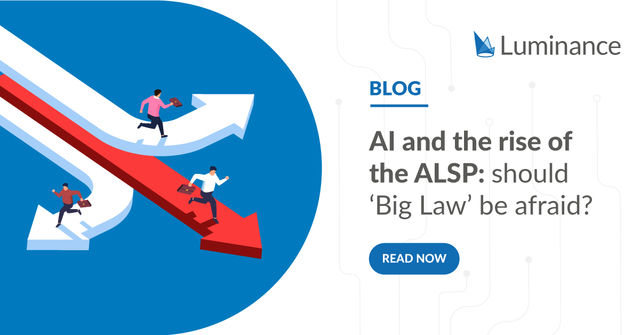
Blog
AI and the rise of the ALSP- should ‘Big Law’ be afraid?
5 March 2021 | Luke Taylor, Subject Matter Expert, Luminance
The term ‘Alternative Legal Service Providers’ or ‘ALSPs’ encompasses any business providing legal services without being a law firm and over the past decade, these new players have really started to make their mark on the legal sector. In fact, a recent study by Thomson Reuters found the ALSP market to now be worth more than $10billion. Most notably, the ‘Big Four’ accountancy network-PwC, Deloitte, EY, and KPMG- all have ABS licenses to operate as multidisciplinary practices. These ALSPs are often characterised by their willingness to rip up the rule book: they aren’t afraid to innovate, and technology-led reviews is often key to how they process projects. For example, all of the Big Four players rely on Luminance’s cutting-edge AI to deliver rapid and insightful legal analysis to their global customer base. But should ‘Big Law’ be afraid of these new contenders? Or are they simply addressing a gap in the market for more cost-efficient, technology-driven legal work?
The role of technology in the rapidly evolving legal ecosystem
The rise of the ALSPs has been driven by a profound shift in client expectations. Whilst previously, clients expected that their lawyers would spend countless hours manually sifting through documents for an M&A due diligence or a litigation case, AI technology like Luminance is now allowing reviewers to cut through this admin-heavy, repetitive work and focus on what matters, drastically reducing time and resource spent on a review. Clients are becoming more sophisticated in their knowledge of the transformative power of technology and are therefore demanding insightful legal analysis on the issues they face at increasingly competitive costs. This demand for more affordable and efficient legal services has made room for ALSPs to compete against regular service providers, like in-house legal departments or law firms.
Because ALSPs don’t need to fit into the typical structure and hierarchy of a traditional law firm, they have found more latitude to change their business practices to increase efficiency by using technology. AI like Luminance is a crucial part of the ALSP service delivery model- powered by a unique blend of supervised and unsupervised machine learning, Luminance is able to immediately read and form an understanding of legal data. This means that without any machine training, Luminance is able to instantly surface key clauses, datapoints and anomalies, becoming increasingly bespoke with continuing use. This powerful new approach to document review means that customers such as Ernst & Young (EY) have consistently achieved time savings of at least 50% in a review.
Luminance’s unique language- and jurisdiction-agnostic capabilities are also important for ALSPs conducting reviews for clients that operate across multiple territories. For instance, EY GSA used the platform for a focused due diligence review of over 6,000 documents. Luminance was able immediately surface key ‘Change of Control’ and ‘Termination’ clauses across English, German, Finnish, Dutch and French documents due to its powerful machine learning approach and language-agnostic capabilities. The time-savings that AI allows lawyers to offer their clients is vast. In EY GSA’s review, for example, the legal team predicted the project would have taken two months to complete manually but with the assistance of Luminance, the advisors conducted their review 50 times faster, completing the exercise in just 16 hours.
This flexible, innovative approach to legal services allows flexibility in the pricing model of ALSPs offer to their clients as well. Whilst the majority of law firms continue to bill by the hour, ALSPs frequently offer clients alternative fee arrangements such as fixed fees or success fees. This is very attractive for budget-conscious clients who want more price transparency and certainty.
ALSPs: redefining the legal market
It is therefore not unsurprising that ALSPs tech-driven approach to legal services is gaining traction amongst corporations and even law firms. In fact, ALSPs are increasingly being used by law firms as a form of subcontracting to help save money and provide additional services, as well as companies who are seeking to cut costs where possible.
The approach of ALSPs is proving effective: for instance, the ‘Big Four’s’ market share reached 4.4% last year and it is projected to grow by another 12.9% this year, with the ALSPs themselves expecting to grow on average 24% per year. PwC and Deloitte now employ more lawyers than most law firms and 23% of large firms in the UK and US say they have lost business to the Big Four. And this momentum shows no sign of stopping anytime soon- Deloitte UK’s recent acquisition of Kemp Little, which doubled the size of its UK legal practice overnight, is a perfect example of this shift. And, with the prestigious Chambers & Partners legal directory now including a dedicated ALSP ranking, it is clear that ALSPs are proving disruptive.
And yet, whilst ALSPs are shaking up the legal market, Big Law still dominates: in 2019, the total market for ALSPs was worth $10.7 bn, a figure that pales in comparison to the revenues of some of the largest law firms – in the same year, Clifford Chance and Allen & Overy both recorded revenues of more than £1.6bn (roughly $2.2bn), while elite US firm Latham & Watkins made $3.8bn.
The future of legal
ALSPs are here to stay and are on the way towards a larger presence in the market, using innovative AI technologies to support them and to enhance their services. Whilst ALSPs have certainly raised the stakes for law firms, particularly when it comes to transactional legal work and their adoption of AI technology to accelerate these types of reviews, ALSPs have also given rise to new potential avenues for growth for law firms. Indeed, many law firms now use ALSPs to drive efficiencies in certain parts of their own review processes.